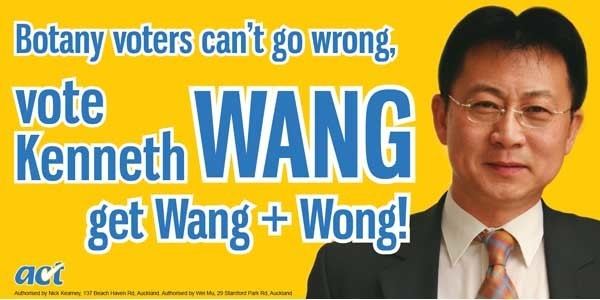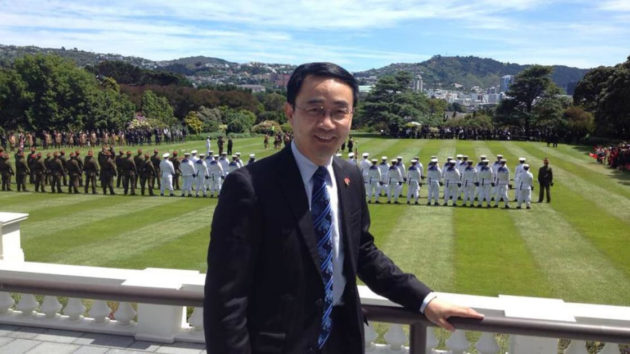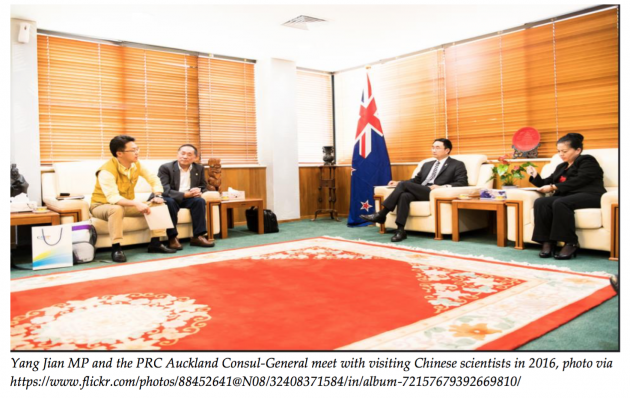Professor Anne-Marie Brady
Supplementary Submission to the New Zealand Parliament Justice Select Committee Inquiry into Foreign Interference Activities, 2019
- Part One: Magic Weapons
- Part Two: Leninist tactic
- Part Three: Soft Power
- Part Four: Making NZ Serve China
- Part Five: Why NZ is of interest to China
- Part Six: China’s relationship with the National Party
As in many other countries in the world, each university campus in New Zealand now has a Chinese Student and Scholars Association, one of the main means the Chinese authorities use to guide Chinese students and scholars on short-term study abroad. The New Zealand organization was formed in 2012 and links all the Chinese student groups on the various tertiary campuses in New Zealand. The New Zealand Chinese Student and Scholars Association is “under the correct guidance” of the PRC representatives in New Zealand.
An important Xi era policy on overseas Chinese work is the goal to encourage the Chinese diaspora to become more active in the politics of their host countries. The numbers of ethnic Chinese candidates at local and national elections in New Zealand is growing. and this is a very natural and positive development for the New Zealand Chinese community, some of whose members have been in the country for over one hundred and fifty years.
Chinese political leaders in New Zealand inevitably come under pressure from PRC diplomats to conform to, and work for, Chinese government policy. Reflecting the diversity of the ethnic Chinese community in New Zealand, many are not attracted to being coopted by the PRC’s representatives in New Zealand.

National’s ethnic Chinese MP Yang Jian, Labour’s Raymond Huo, and ACT’s Kenneth Wang have had varying degrees of relations with united front organizations in New Zealand and the PRC embassy. Kenneth Wang entered parliament from 2004-2005 as list MP for the ACT Party and was deputy leader of the party until 2014. Wang is descended from a CCP revolutionary family, he is the grandson of the first CCP governor of Shanxi Province, Wang Shiying.

In 2005, Wang was invited to China to meet with the Guangdong Overseas Chinese Association. Wang’s pro-Chinese investment, pro-Chinese immigration policies have been reported favourably in China. In past years, PRCANZ organized many fund-raising events for Wang and encouraged the ethnic Chinese community to block vote for him. Since 2005 Wang has been honorary president of the New Zealand Beijing Chamber of Commerce. He also has leadership roles in a number of other united front-linked organizations: Vice President of the Beijing Association, New Zealand President of the University Alumni Association, and New Zealand Bowo International President.
When Kenneth Wang first entered Parliament as a list MP, 47 percent of Chinese voters voted Labour. But in the 2014 election, 75 percent voted National. National has worked hard to attract the ethnic Chinese vote, investing in saturation media presence in all the Chinese language traditional and social media platforms in New Zealand. National elected its first ethnic Chinese MP, Pansy Wong, in 1996, but she was forced to resign from Parliament in 2011 over scandals related to her misuse of travel perks. Wong had been in the media spotlight for a number of years, over allegations that her husband, Sammy Wong, had used his wife’s status to boost his business deals in New Zealand and China.
After Pansy Wong was forced out of Parliament, former University of Auckland political studies lecturer Dr Yang Jian was shoulder-tapped by National Party President Peter Goodfellow to become the second ethnic Chinese MP because he was told, “National needs the Chinese vote.” At the time of entering parliament, Dr Yang already had a profile in the ethnic Chinese community in New Zealand due to his community activities as well as his academic status. From 2006 Dr Yang had also been involved in New Zealand’s Track 2 diplomacy.

As widely reported in the New Zealand and international media in 2017,114 Yang Jian worked for fifteen years in China’s military intelligence sector. It was a history which he has admitted he concealed on his New Zealand permanent residency application and job applications in New Zealand, as well as his public profile in New Zealand—at least in English sources.
However in an article in the People’s Daily (Renmin ribao) magazine, Huanqiu renwu (Global People) in 2013, which was republished in a number of websites, Yang Jian gave an extensive interview detailing aspects of his earliest years, his career in China, and subsequent activities in Australia and New Zealand. Yang Jian entered the PLA-Air Force Engineering College to study English in 1978; he taught at the same college for five years after graduation, trained at the People’s Liberation Army Luoyang Foreign Languages Institute for his first Masters degree, studied for a year at the Hopkins-Nanjing Center for US-China Studies at Nanjing University, and after that, from 1990 to 1993 taught English to students at the Luoyang Foreign Languages Institute who were studying to intercept and decipher English language communications.
Yang Jian does not mention his 15-year career and studies with the PLA on his National Party online cv, and it also does not appear on the online cv provided for his profile when he was a lecturer at the University of Auckland. But he did provide this information in a cv in English to be circulated to Chinese officials which he gave to the New Zealand Embassy in China, preparatory to a visit to China in 2012, the year after he entered parliament. And a Chinese language report promoting the setting up of the National Party’s Blue Dragons organization (an ethnic Chinese youth group within that party), highlights his studies at the Luoyang Foreign Languages Institute, while not mentioning any other details about his working life or other tertiary studies when he was living in China. The Financial Times speculated that these selective mentions of his past links with the Luoyang Foreign Languages Institute were meant as a “dog whistle” to the Chinese community in New Zealand
The PLA-Air Force Engineering College is the PLA-AF’s elite training institution, one of the top ten military colleges in China. So if Dr Yang was allowed to stay on as a teacher after teaching, he would most likely have had to be admitted to the CCP at some point when he was a student, as a teaching position in a military academy would require Party membership. Dr Yang admitted to journalists that he is a CCP member—though insisted he had not been an active member since he left China in 1994. However once someone is accepted into the CCP (which involves an extremely rigorous two-year supervision process), regardless of how an individual may feel, they are always regarded as a Party member; unless they are officially expelled from the CCP. This happens very rarely—one would have to be a traitor or commit a serious disciplinary offence for it to occur.
Yang’s second place of study in China, the PLA Foreign Language Institute at Luoyang, is part of the Third Department of the Joint Staff Headquarters of the PLA, one of the PLA’s two military intelligence agencies. The third department is the equivalent of the USSR’s GRU or the USA’s National Security Agency. The Third Department is in charge of China’s signals intelligence operations and provides intelligence assessments. Linguists assigned to the PLA Third Department are sent to the Luoyang Foreign Languages School for Language training, then assigned to a Third Department bureau for technical training. Yang Jian’s wife, who goes by the English name “Jane”, was in the same graduate programme with him at the Luoyang Foreign Languages Institute. Jane is an IT specialist, who got a job in information technology at the University of Auckland when Dr Yang took up a lecturing position in international relations there.
The PLA would not have allowed anyone with Yang Jian’s military intelligence background to go overseas to study—unless they had official permission. Even if he had left the PLA, he would have had to wait at least two years before he would be allowed to go abroad and he would have had to have official permission from his former employer to obtain a Chinese passport. In 1994 Yang Jian moved to Australia to study for his second Masters in International Relations and then a PhD at the Australian National University. He quickly became heavily involved in united front activities there. He was chairman of the Chinese Student and Scholars Association in Canberra for many years; and after he moved to Auckland, he took on leadership roles in overseas Chinese activities there too.
Since he entered parliament, Yang has been a central figure promoting and helping to shape the New Zealand National government’s China strategy and been responsible for their engagement with the New Zealand Chinese community. From 2014-2016, Yang Jian was a member of the Parliamentary Select Committee for Foreign Affairs, Defence and Trade. Yang accompanied New Zealand PM John Key and his successor PM Bill English on trips to China and in meetings with senior Chinese leaders when they visited New Zealand. This role would have given him privileged access to New Zealand’s China policy briefing notes and positions.
**Under normal circumstances, someone with Dr Yang’s military intelligence background in China would NOT have been given a New Zealand security clearance to work on foreign affairs.
Elected MPs are not required to apply for security clearance.

To read the submission in full you can download it below.

